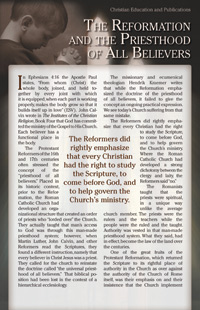
Order the 2012 Reformation Insert from the PCA Bookstore
In Ephesians 4:16 the Apostle Paul states, “From whom (Christ) the whole body, joined, and held together by every joint with which it is equipped, when each part is working properly, makes the body grow so that it builds itself up in love” (ESV). John Calvin wrote in The Institutes of the Christian Religion, Book Four that God has committed the ministry of the Gospel to His Church. Each believer has a functional place in the body.
The Protestant Reformers of the 16th and 17th centuries often stressed the concept of the “priesthood of all believers.” Placed in its historic context, prior to the Reformation, the Roman Catholic church had developed an organizational structure that created an order
of priests who “lorded over” the Church. They actually taught that man’s access to God was through this man-made priesthood system; however, when Martin Luther, John Calvin, and other Reformers read the Scriptures, they found a different instruction, namely that every believer in Christ Jesus was a priest. They called for the church to reinstate the doctrine called “the universal priesthood of all believers.” That biblical position had been lost in the context of a hierarchical ecclesiology.
The missionary and ecumenical theologian Hendrik Kraemer writes that while the Reformation emphasized the doctrine of the priesthood of all believers, it failed to give the concept an ongoing practical expression. We see today’s Church suffering from that same mistake.
The Reformers did rightly emphasize that every Christian had the right to study the Scriptures, to come before God, and to help govern the Church’s ministry. Where the Roman Catholic church had developed a strong dichotomy between the clergy and laity, the Reformers said “no.”
The Romanists taught that the priests were spiritual, in a unique way unlike the average church member. The priests were the rulers and the teachers while the people were the ruled and the taught. Authority was vested in that man-made priesthood system. What they said, had in effect, become the law of the land over the centuries.
One of the great fruits of the Protestant Reformation, which returned the Scripture to its rightful place of authority in the Church as over against the authority of the Church of Rome itself, was their emphasis on and their insistence that the Church implement the universal priesthood of all believers. R. B. Kuiper called this doctrine “a distinctly Protestant doctrine.” We observe that since the days of the Protestant Reformation the Church has, too often, neglected the implementation of this truth. We continue to see the tendency to make a strong dichotomy between the clergy and the laity.
Unless the church practices this great biblical doctrine, it will never be able to function in the manner in which God intended. We believe that both clergy and laity share the blame for this neglect. Often the clerics feel more secure if they are in control, plus many are not equipped to implement this doctrine. However, the laity is also at fault because they have been unwilling to become that involved in the church’s ministry. It is generally easier to hire clergy (professionals) and other staff to do the work of ministry. In many churches the involvement of the laity is much less than the Scripture indicates it should be.
The thesis found in Ephesians 4:16 is that each believer has both a position and a function in the Church’s ministry. The challenge is always how to create an environment in the church where “each part does its work.” Every Christian is enlisted in carrying out the mission and ministry of the Church. That is integral to their call to Christian discipleship and kingdom living.
R. B. Kuiper, in his classic, The Glorious Body of Christ, emphasizes this “Priesthood of All Believers” doctrine. He refers to it as the universal office in contrast to the extraordinary offices both of which are built on the prophet, priest, and king concept. He underscores that each believer is part of the universal office of prophet, priest, and king. He further says this is one of the most significant doctrines restored by the Protestant Reformation.
In one sense we could say that one of the fruits of the Protestant Reformation was to get the Church into its rightful place within the kingdom in order to carry out its God given assignment to make kingdom disciples who in turn would do their part in making kingdom disciples. As we have said in other places, the effectiveness of the kingdom of God is generally determined by the energy and focus of the Church. That is the procedure for how God’s truth and the good news of the kingdom make a difference in the world.
“The Reformation leaders went back to the Apostolic Church, as described in the New Testament, to find there the spirit and practice of the Church as they believed it should operate and closely related to this aspect of reform was the stress on the priesthood of all believers,” writes B. K. Kuiper. What fell through the cracks with the twofold thrust of that doctrine was the second part of “each part working properly.”
Therefore, the Reformation principle of the priesthood of all believers is needed within the community of believers in order for the Church to fulfill its assignment from Jesus, the King and Head of the Church.

